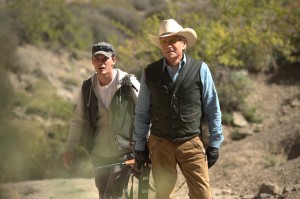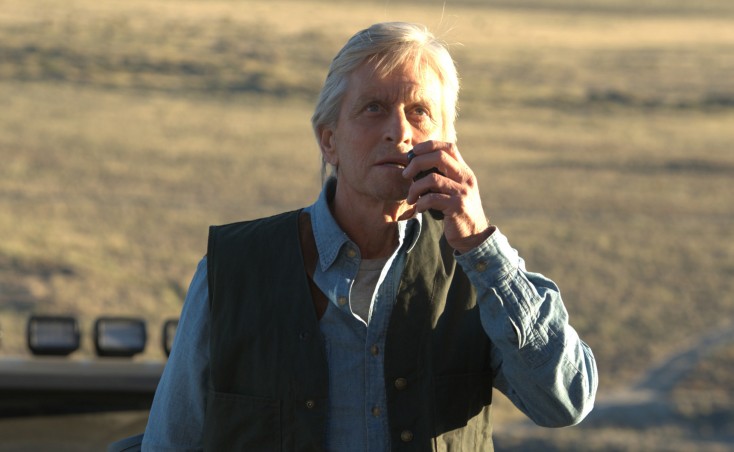
(l-r) Jeremy Irvine and Michael Douglas star in BEYOND THE REACH. ©Roadside Attractions. CR: Clay Enos.
By ANGELA DAWSON
Front Row Features
HOLLYWOOD—Imagine if Gordon Gekko went on a big game hunt out in the Mojave Desert, accidentally got into some trouble and didn’t want to go to jail, then you would have something of the set up of “Beyond the Reach.”
Academy Award winner Michael Douglas (“Wall Street,” “One Flew Over the Cuckoo’s Nest”) is in full bad guy mode once again playing a billionaire tycoon named Madec, who is accompanied on his expedition by a young local tracker named Ben, to the remote arid location in Madec’s souped up Mercedes truck. When Madec, who is brokering a big deal abroad by satellite phone, inadvertently shoots an old prospector, he realizes he has to do away with the only witness. Being a sporting man, he allows Ben to strip down to his skivvies then proceeds to chase him across the desert floor expecting the young man to expire from dehydration and heat exhaustion before the day is out.
The thriller is based on the 1972 Robb White novel “Deathwatch” and is directed by Jean-Baptiste Leonetti. It co-stars Jeremy Irvine (“War Horse”) and Ronny Cox (“Deliverance”) as the local sheriff.
Most of the action in the film centers on Douglas, who also serves as a producer, and Irvine, in a riveting cat-and-mouse game.
Douglas, 70, recently spoke about what attracted him to the film, his upcoming role in the Marvel action fantasy “Ant-Man,” and why he recently felt compelled to speak publicly about his abhorrence of anti-Semitism.
Q: What made you decide to produce this movie?
Douglas: I read the book in 1972. Rob was a young adult writer and identified with Jeremy’s character. I just remember it being a really exciting, page-turner book. Cut to I end up acquiring a literary company that had the rights to Damon Runyon, Shirley Jackson and Rob White. I’m looking through the list and I see “Death Watch” and I thought, “I read that a while ago. That would be a great little two-hander, a small indie film. How difficult would it be?” Going into the desert. We got Stephen Susco, the writer, to put a good screenplay together. Jean-Baptiste (Leonetti, the director) became involved and I just thought it would be a fun thriller to make. So that’s how it came about.
Q: How much of it changed from the book?
Douglas: The basic premise was the same, obviously. But from the ‘70s to now, we updated it. Everything was a little more naive back in the early ‘70s than it is today. Emergency transponders, cell phones (are some of the) things that we added.
Q: The “Ant-Man” trailer recently was revealed and Marvel fans are extremely excited about this film. Any way you could give some tidbits?
Douglas: If I give you any tidbits, I get a Marvel blow dart to my head. I’ve never seen a company more conscious of their content. Yeah, it looks good. We just did a couple of re-shoots, ADR things, and it was the first time I’d seen a lot of it. These Marvel guys haven’t missed yet. From “Avengers” and everything, this is more in tune with “Guardians of the Galaxy.” It’s got some humor. Paul (Rudd, who plays Ant-Man) does a great job. My kids are going to be very happy.
Q: You recently penned a powerful op-ed piece for the “Los Angeles Times.” What has been your family’s reaction to the piece and general reactions?
Douglas: You’re referring to my piece on anti-Semitism. My family has been supportive. I didn’t necessarily want to drag my son (Dylan) into this whole discussion, but he has, and the reaction has gone viral. It’s been picked up all over the world. It had a little bit to do with being a celebrity and not that it was so well written. It’s just an issue that’s important to bring up to the surface. Even today I saw in the “L.A. Times” a story about a young woman at Stanford University, running for office, and this issue came up. So it’s going around on campuses. Sometimes you have to separate politics of a country from its religion, but we’ll see. It’s going to be an issue I’m going to be involved with at least for the next year or so because of the Genesis Prize, which I was awarded this year. It’s a $1 million prize and it’s the second year. (Former New York mayor) Michael Bloomberg won it last year.
Q: Speaking of billionaires, how was it sitting in the luxury Mercedes sipping a martini while your “Beyond the Reach” co-star Jeremy Irvine had to get into the sunburn makeup stand in the desert in his underwear in the hot sun every day during filming?
Douglas (He chuckles.) Well, I was the producer. So it’s one of your better acting jobs where I’m wearing both hats. Because the joy in acting—and Jeremy is extraordinary in his discipline and his tenacity to take it on—but with acting they pay you to focus on your part, your role whereas in producing you have to see if they have 360 degree vision of what you’ve got, of what’s going on. So I usually don’t enjoy it a whole lot, although I enjoy the risk-taking, the physical aspects of sort of being outside in an environment. I think back to “Romancing the Stone,” “The Ghost in the Darkness,” productions that I did in rough locations. It creates an esprit de corps. It kind of brings everybody together. There’s not much else you can do out there in the Navajo Nation. It’s about an hour and a half away, if you’re lucky, from your hotel room bed, and so it brings out the best in everybody, or it doesn’t. In this case, we were very fortunate to have a great New Mexican crew made up of a lot of people who love mountain bikes, hiking and this and that. This is just the kind of picture that they wanted to be involved in. I think it was an inspiration for both of us (me and Jeremy) to watch (the crew) climb up the rocks and go at it.
Q: You’ve played rich baddies before. What’s the trick to these types of characters?
Douglas: Well, in “The Game,” he was not very nice from the beginning. You sort of love to hate him.
Q: He was kind of a victim.
Douglas: Yeah, he was the victim in that one. Exactly. So that’s why you can do it. The other ones … I’m thinking of “A Perfect Murder” and, of course, Gordon Gekko (“Wall Street”). I just have to say it’s good to be bad. It’s fun. You have to enjoy it. You really do. You’re kind of above everything. You can pay off anybody. You have no moral compass. You just try to make (the characters) as charming as possible and fun, so everybody says, “I’d kind of like to be that guy!” I sort of learned that after “Wall Street” because (my character) went to prison. I had one guy from Wall Street saying to me, “You’re the man! You’re the man! You’re why I got into this business.” I said, “(Gekko) went to jail.” And he said, “Oh, that’s OK. It’s nothing.” So some people go for the clothes; they go for that look. It’s fun, and then you can kind of twist it around. Once you’ve seduced and brought them in, then you can show how bad you can really be.
Q: You’re character treats himself by buying a nice car and going big game hunting. How does Michael Douglas treat himself?
Douglas: My luxury would be boats. I like to charter boats, sailboats, to take the family and go off and scuba diving on an island. I like to dive.
Q: Jean-Baptiste Leonetti’s last film was completely different from this one so what made him the ideal choice for this project?
Douglas: I felt he certainly had style. You’re talking about “Carre Blanc?”
Q: Yeah.
Douglas: And he had a sense for the mystery of this, the thriller aspect, and he was passionate about this. He has a tremendous love for westerns. He talked about the history and his knowledge about John Ford. So I thought sometimes somebody from a different country has a new twist on an old form. So it’s kind of a combination: his passion and the fact that his filmmaking and his style would be a good fit.
Q: What did you learn from Jeremy Irvine, who’s British? You come from different backgrounds as actors and as human beings.
Douglas: Well, as an American actor, I’m not very good on accents. I have the privilege of being in this large American (film) industry that I’ve hardly ever been called upon to (do another accent). I’m so impressed with the number of British actors, in particular, although even Jeremy’s love interest in this movie is Australian, but they have learned and rightly or wrongly they’re taking away a lot of parts away from Americans, just because of their good acting.
We didn’t go out of our way to have a British actor for this part to play a 19-year-old kid from New Mexico. So he pulled it off, right from the beginning. I think there is a seriousness about Jeremy, not necessarily on-camera, but just how he goes about his craft, that’s missing from a lot of actors here. A lot of American actors are more concerned with their image, their You Tube image, or whatever it might be, rather than just playing the part. Jeremy proved to be so committed to the role, and I’m sure it was a lot more difficult than he anticipated—the physical aspects of the movie—he never once complained.





